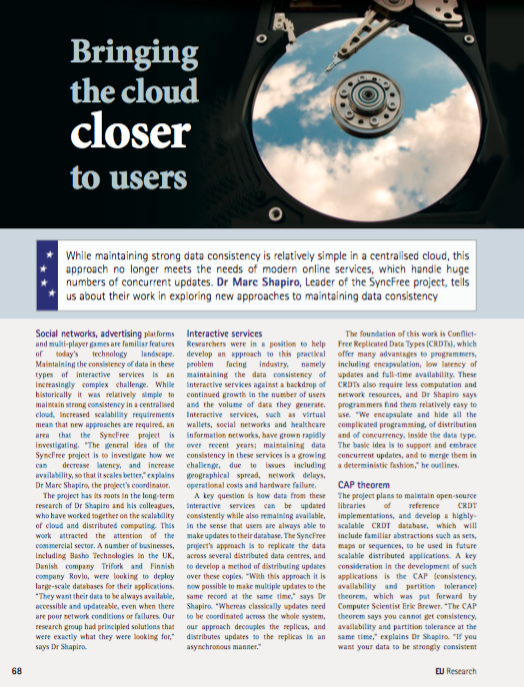W-PSDS 2015
3rd Workshop on Planetary-Scale Distributed Systems (W-PSDS 2015) co-located with SRDS 2015.
Distributed systems have gained a more prominent role in the everyday life of many people. Additionally, the scale of these systems has also been increasing over the past decade, and systems that interconnect users at a planetary scale are now common place. Users expect these systems to be robust, highly available, safe, and efficient. This leads to the emergence of significative challenges for the scientific community to find solutions that provide all these characteristics. The goal of the workshop is to bring researchers and practitioners from the large-scale distributed systems communities to discuss the current state of the art, emerging challenges and trends, as well as novel solutions, implementation and deployment of large scale, and in particular of planetary-scale, distributed systems and applications. The workshop is looking for submissions in the form of papers with no more than 6 pages describing novel contributions and results as well as experiments reports. The organization welcomes contributions from both academia and industry. Industry submission (or submissions with co-authors from industry) should be labelled as so for notifying reviewers. All submissions will be reviewed by members of the workshop program committee, that will select the best submissions for presentation at the workshop. Regular papers will appear at the workshop proceedings published in conjunction with the proceedings of SRDS.
Areas of interest include, but are not limited to:
- Novel storage organizations for large scale systems (e.g., NoSQL databases, in-memory databases, geo-replicated systems).
- Consistency, reliability, and fault models for large scale distributed systems
- Data recovery: online and disaster recovery
- System assumptions for dependability and performance
- Scaling-out and elasticity with large number of nodes
- Fully decentralized versus central control architectures
- Robust and efficient protocols for unstructured overlay networks (epidemic-based dissemination, aggregation, slicing)
- Peer-to-Peer systems, protocols, and applications
- Large-scale infrastructure technologies (locking, group membership services)
- Cloud computing
- Grid Computing
- Smart Grids
- Security and privacy for planetary-scale distributed systems.




